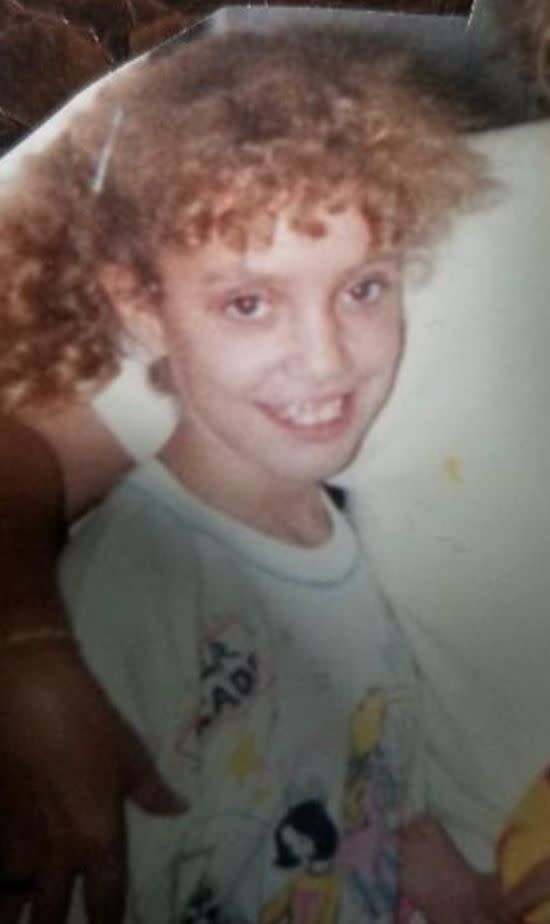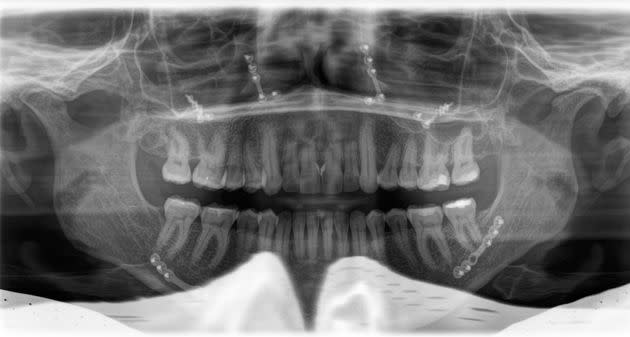I Tried Everything To 'Fix' My Face. Here's What I Realized Decades And Thousands Of Dollars Later.

I am 43 years old and, until recently, I was seriously considering a fourth round of orthodontia.
I was born with a severe overbite and deformed jaw, a condition known as a Class II malocclusion and skeletal imbalance.
I had standard metal brackets placed on my teeth when I was 12. The second round of treatment involved sturdy plastic trays — popularly known as Invisalign — at 25. With the third round at 33, I wore metal brackets again, only this time it was topped off with orthognathic (double jaw) surgery and my jaw was wired shut for weeks.
By then, I’d spent nearly $15,000 and almost one-third of my life actively trying to reshape the lower half of my face. Ten years later, I still believed that my teeth were not socially acceptable or eye-pleasing and that I needed to undergo more dental work to fix them.
My teeth have always looked as though they were running a race against my face and, because of it, the bullying I’ve endured has been relentless. It was so bad that sometimes, when I was out doing errands for my mom in our Brooklyn neighborhood, kids would shout at me from their windows as I passed. It was traumatizing.
What I didn’t understand until many years later, when I began writing books for children, was just how life-altering some of those experiences were. Something changes in you when an entire neighborhood of children chants cruelties in your direction every time they see you leave your front door.
As a child, I’d done what many children do to cope: I escaped into books — “The Babysitters Club,” Nancy Drew mysteries, the Hardy Boys, and Beverly Cleary’s novels. I enjoyed these books, but was never fully able to connect with the babysitting or mystery-solving or fun-loving adventures in them. My adventures were less wholesome and centered on navigating what the other kids (and even some adults) were going to say about my face.
My peers often called me “bucky beaver” (a nickname that was coined — and circulated — by a close family member) instead of my name, and the adults (including my parents and some of my teachers) laughed when they heard it. I still have dreams about these experiences, and wake up unsettled each time.

As I crept toward my 20s, I was shocked to learn that not even adulthood would shield me from scathing — and unsolicited opinions — about my teeth. When I was 23 (two years before my second round of orthodontia), I made a routine trip to the dentist. I was new to the area and had made an appointment with this particular office based on a recommendation. At the end of the visit, my new dentist said that everything looked great on the X-rays and that my home care was superb — a habit I’d picked up from my father, whose bathroom cabinets were always stocked to the hilt with dental floss and gum stimulators.
“Except for this,” my dentist had said, tapping on my front teeth with his fingers. “This doesn’t look very nice.” His critique was strictly based on aesthetics and the extent to which I was considered visually pleasing to others.
Trips to the dentist aren’t designed to be fun, but they shouldn’t be dehumanizing, either.
That dentist certainly wasn’t the only adult to express concern over the position of my top teeth. Once a music teacher told me my teeth were a “distraction” from my singing. Even strangers on the street felt justified in offering their critiques.
Not long after that experience at the dentist, I was substitute teaching in New Jersey. After I’d been to one parochial high school several times, I’d gotten to know a handful of students. Before long, they began to loudly mimic a horse’s neighing whenever they saw me coming down the halls. The irony of the school’s Jesus-centric décor and its messages about loving “thy neighbor” that adorned the halls and classrooms were not lost on me.
I’ve spent my life contending with an unfortunate reality: like opinions about money, jobs, education, relationships, and a seemingly endless collection of other issues, most people have ideas about what others should be doing with their teeth. What I didn’t know then is that America has a long, manufactured history with perfect teeth — an obsession that began in the 1800s with the country’s first dental college.
When I had my third round of braces, I was seeing an orthodontist who mainly catered to adolescents. At each visit, I sat among mostly middle schoolers in the waiting room who were there to be seen by our doctor. Though I was usually the only adult patient present, photos of smiling, middle-aged celebrities (like Gwen Stefani) wearing braces adorned the office’s walls. The intended message, I think, was, “Look at how brave she is to walk around as an adult with all that metal hugging her teeth. See? She doesn’t care what people think. This could be you.”
The message I received was, “This should be you. In case you aren’t aware, there’s something majorly wrong with your face — you’re an adult. Fix it! Fix yourself! What are you waiting for?”
I have spent almost as much on trauma-informed therapy as I have on orthodontic care, and it’s helped. But you know what might have been even better than therapy? Creating a fictional character who struggles with the possibility of jaw reconstruction surgery.
Writing my children’s book truly helped me heal from the trauma of my own experiences. In “Jawbreaker,” my debut novel, the main character watches her parents wage war over their money issues and her dad’s excessive drinking. She feels tremendous guilt about her expensive facial condition, even though it’s not something she can control, because she knows her parents are barely able to stay afloat financially. On top of all of all of that, the bullies at school are relentless — and her own sister is the cruelest of them all.

It took nearly 30 years, but writing this book and, in the process, processing everything I have been through, finally allowed me to truly understand that others’ opinions about my teeth — my entire face — are no longer a crisis that I need to fix or even address. I’ve realized maybe it’s actually these other people who have said these things — and inflicted such profound emotional abuse — who are the ones in crisis.
For those with mouths like mine, smiling can be an act of resistance. When I recently caught a glimpse of myself laughing in a mirror, I knew that I’d turned a corner. I was struck by how nice my smile looked. Despite my three rounds of braces and double-jaw surgery, my teeth and jaws are still not perfect, but they’re healthy, and they’re mine.
I no longer feel the contempt for my face that I’d gotten so used to feeling when I saw my reflection.
Learning how being comfortable in your own skin is life changing. I’m now more inclined to smile at strangers. I’m more willing to be in photos (assuming that I’m having an OK hair day). And although most photos of me are all teeth, I’m OK with it. That’s me. In fact, I’m starting to like those pictures.
My current dentist also loves my teeth. She has never once suggested that I need to change them in an effort to be more accepted.
Best of all, as an author and teacher, I get to talk to classrooms and auditoriums full of children who I know may be going through similar difficulties. Not too long ago, I would have declined those opportunities because I was too overwhelmed by the negative ideas about my teeth and face that have been imprinted on me since I was young.
I no longer pine for the chance to confront those who’ve hurt me as a child or as an adult, as I now know it won’t do me any good. There are so many reasons why someone might choose to be cruel, but none of them have anything to do with me. I want to spend my time and energy on all of the incredible people in my life, everything I want to see and do and create, and all of the beautiful chances I have to smile.
Christina Wyman is a USA Today bestselling author and teacher living in Michigan. Her debut novel, “Jawbreaker,” is a middle-grade book that follows a seventh-grader with a craniofacial anomaly that’s caught the attention of school bullies — including her own sister.“Jawbreaker,” published by Farrar, Straus and Giroux, is a Publishers Weekly Best Books of 2023 and is available wherever books are sold, including through local independent bookstores. Her highly anticipated forthcoming middle-grade novel, “Slouch,” will be available for sale in the fall of 2024.
Do you have a compelling personal story you’d like to see published on HuffPost? Find out what we’re looking for here and send us a pitch at pitch@huffpost.com.

 Yahoo Lifestyle
Yahoo Lifestyle 